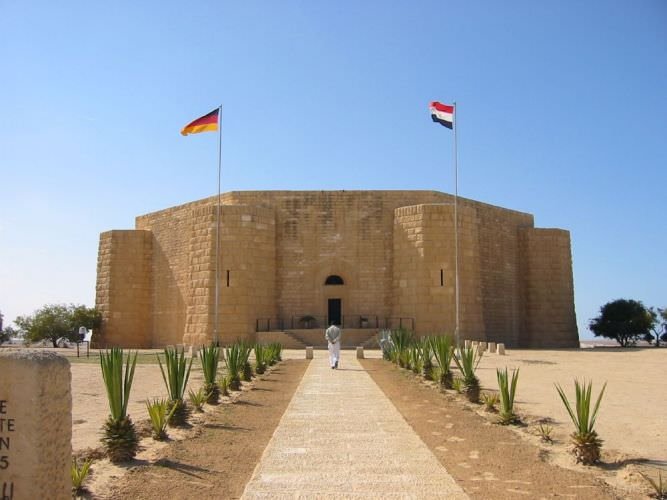
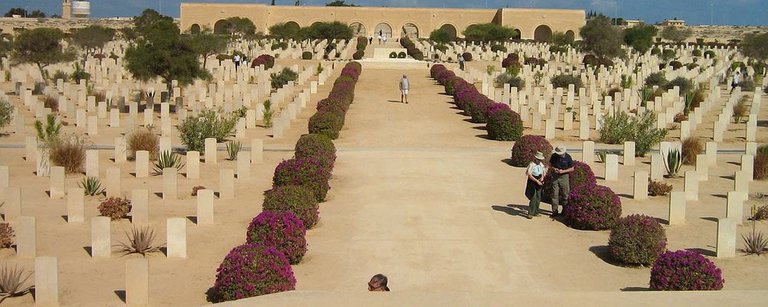
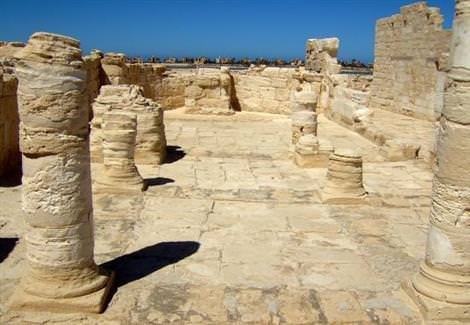
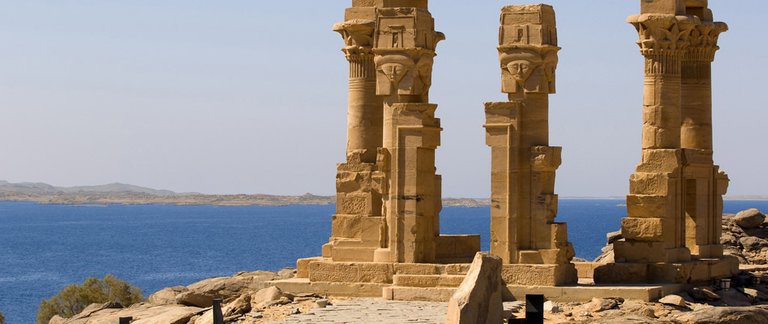
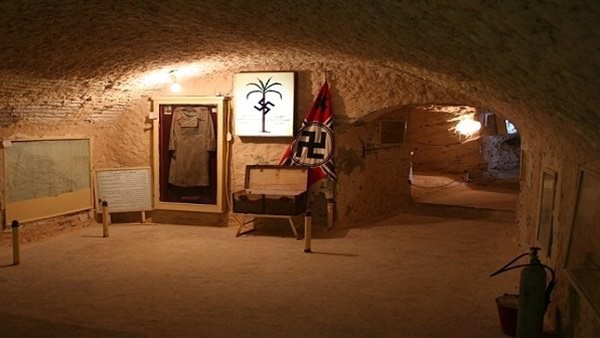
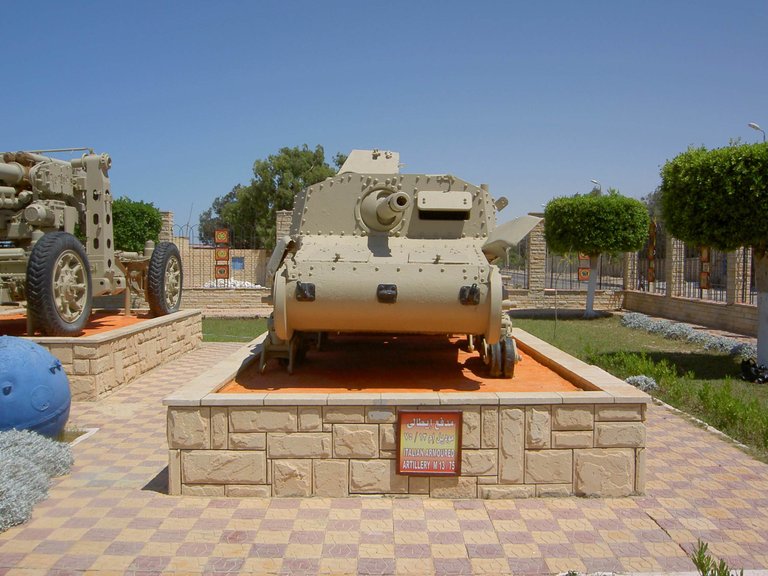
Al-Alamein is one of the cities of Matruh Governorate and is located to the east of Marsa Matrouh city and west of the city of Alexandria, with a population of about 10922 people. The city is divided into three main areas: El Alamein, Sidi Abdel Rahman Village and Tal El Eis Village. The Battle of El Alamein, one of the most famous battles of the Second World War between the Allied and Axis Powers, was fought on its territory, in which the forces of the German-African Legion suffered defeat.
The city includes tombs, monuments and a museum to commemorate the victims of the battle of various nationalities. The city's economy depends mainly on its natural wealth of petroleum, which is being explored by several Egyptian companies and tourist areas which spread to a number of luxury tourist villages such as Porto Marina and Marais Sidi Abdel Rahman.
The city dates back to the Roman era, where the ancient town of Leukaspis, an ancient Roman coastal city, was situated at the time. It had a population of 15,000 at the time. The city center features a Roman cathedral and a large hall converted into a church. The village was once a trade center between Egypt and Libya and Crete imports. The ancient colony was destroyed in 365 by a tsunami triggered by an earthquake outside the coast of Crete.
The town was not rebuilt due to the turbulence of the then Roman Empire. The impact of Leukaspis was lost until 1986, when a group of engineers working on road construction at El Alamein Marina discovered old houses and tombs. 200 acres of surrounding land were classified as an archaeological area, and archaeological excavations began in the 1990s.
Battle of Elamein I
The Battle of El Alamein I or the battle of Halfa flag is one of the battles of the Second World War which took place in the city of El Alamein between the Allied countries represented by the 8th British Army under the command of Montgomery and the Axis Powers represented by the African Legion consisting of German and Italian forces under the command of Rommel August 7 to September 7, 1942, ended with the victory of the 8th British Army led by Montgomery and the withdrawal of the African Legion Corps, which suffered from a shortage of supplies and continued British bombardment by flying fire and artillery, which led to its failure to reach the Suez Canal in the Six Day Race.
Battle of Elamein II
The Battle of El Alamein or the Battle of Elamein II is the battle that took place from 23 October to 4 November 1942 during World War II on the land of El Alamein between the 8th British Army led by Montgomery and the African Legion led by Rommel. The battle ended with the victory of the British as a result of their superiority in terms of gear and equipment, where British troops mobilized more than a thousand tanks, twice the number of German tanks and 450 artillery in addition to the superiority of air bombers in Britain, while German forces lacked appropriate air cover and suffered from the introduction of artillery and weak supplies.
Natural and tourist attractions
Egypt hold an annual memorial service in October in Al-Alamain in Matruh Province for the victims of the first and second Al-Alamain battles, which will be held between the Allied and Axis forces. The meeting will be attended by representatives of the Commonwealth countries, including England, France, Canada, Greece and India, and representatives of Germany and Italy. With the participation of several Egyptian military and security figures, dozens of delegations from various countries, a number of veterans who took part in World War II battles in Western Sahara, and a group of families of soldiers who were victims of the World War. The ceremony includes laying wreaths on the graves of the soldiers, accompanied by the launch of the English, Italian and German military trumpets, playing musical instruments, singing the priests and reading hymns on the graves.
Commonwealth Cemeteries
Designed by the British noble Sir Heber Worthington, and opened by Bernard Montgomery in October 1954, accompanied by a number of soldiers and a large number of civilians. The graves include the remains of 7,367 victims from Britain, New Zealand, Australia, South Africa, France, India and Malaysia. They also include the names of 11,945 soldiers whose bodies have not been found, some of whom have written their names on the walls
Italian Cemeteries
Designed by the Italian architect Paolo Kashia Dominion Conte Sila Venco, an Italian nobleman who took part in the Battle of El Alamein. The cemetery was opened by Italian Prime Minister Amintore Fannavi on January 9, 1959, where the remains of 4634 Italian soldiers are buried. A small church, a mosque, a memorial hall and a small museum, as well as a memorial plaque indicating that the desert has swallowed the bodies of 38,000 victims.
German tombs
German and Italian soldiers remained buried in one cemetery until 1956, when the German government decided to build a private cemetery for the Germans, designed by the German engineer Robert Tessgler. It was opened in October 1959. The tombs were built in the form of a castle and contain the remains of 4280 German soldiers divided into eight rooms, Each room has 600 soldiers, while the eighth room includes 80 unidentified soldiers. It is located three kilometers west of El Alamein city and overlooks the sea directly from a relatively high mountain.
شكرا للمشاركة الجميلة.
حصلت على تصويت من
@arabsteem curation trail !
** يسرنا اعلامك انه يمكنك الحصول على تصويت اضافي عبر ارسال مبلغ ضمن
0.05 - 0.15
ستيم او اسبيدي الى حساب التصويت الالي الجديد
@arabpromo
مع رابط المقال في حقل المذكرة (memo)
مما يتيح لك الحصول على تصويت من 0.10 الى 0.40 :)**
Congratulations! This post has been upvoted from the communal account, @minnowsupport, by hossamcrist from the Minnow Support Project. It's a witness project run by aggroed, ausbitbank, teamsteem, theprophet0, someguy123, neoxian, followbtcnews, and netuoso. The goal is to help Steemit grow by supporting Minnows. Please find us at the Peace, Abundance, and Liberty Network (PALnet) Discord Channel. It's a completely public and open space to all members of the Steemit community who voluntarily choose to be there.
If you would like to delegate to the Minnow Support Project you can do so by clicking on the following links: 50SP, 100SP, 250SP, 500SP, 1000SP, 5000SP.
Be sure to leave at least 50SP undelegated on your account.